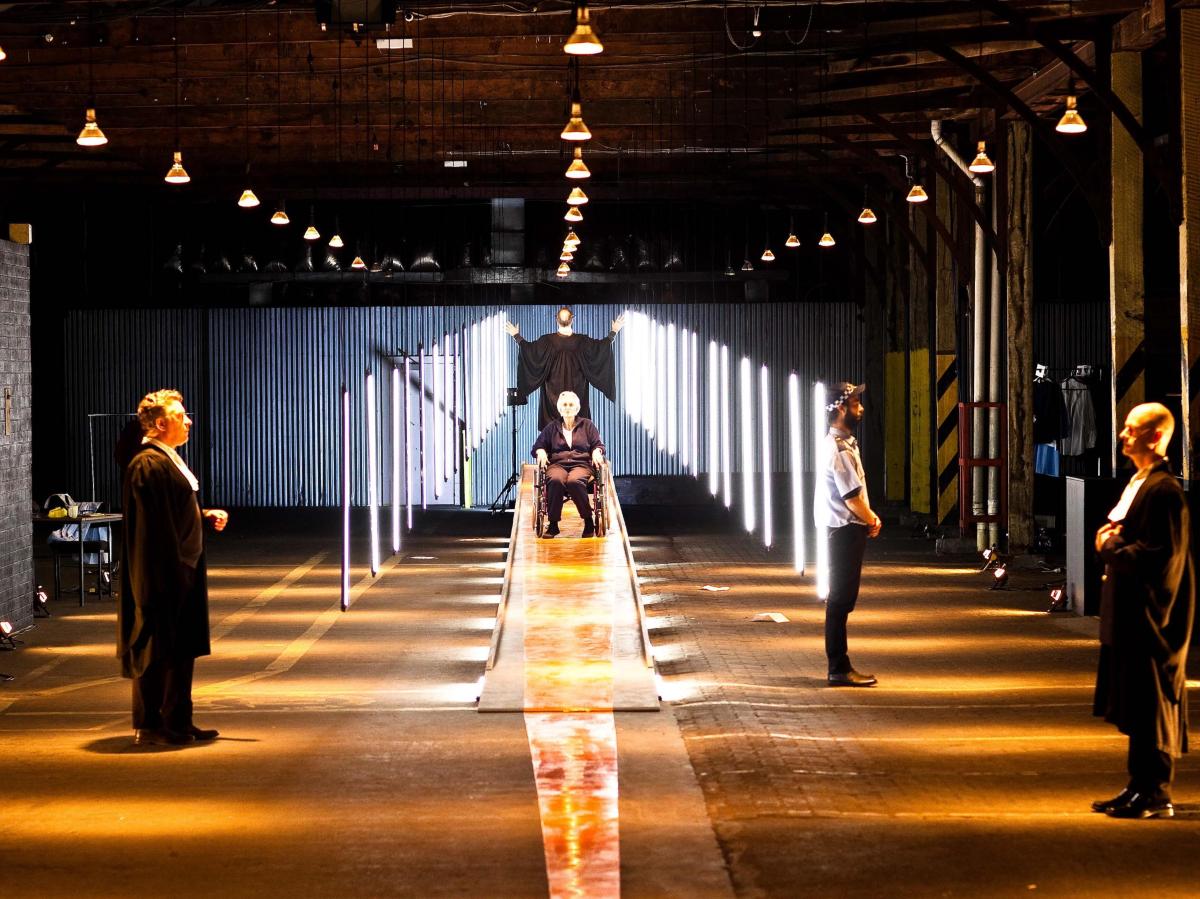Photo credit: Richard Parkinson.
Susan Neill-Fraser is the embodiment of An Inconvenient Woman. In official records you see a portrait of a woman accused of interrupting a police investigation, painted as a deliberate manipulator; her story full of inconsistencies in timelines, and missing details. But perhaps more importantly, it’s also her inability to follow a neat and predictable pattern of behaviour that makes her An Inconvenient Woman. A woman to be suspicious of.
In 2010, Neill-Fraser was convicted of murdering her husband, Bob Chappell. The case caused significant controversy in Tasmania. In this piece of theatre, written by Brian Peddie and drawing on official transcripts, we explore not only Neill-Fraser’s journey but also the justice system surrounding the decision. The transcript and delivery of the interview script give the work authentic verbatim theatre impact.
There have been some bold choices made by director Aidan Fennessy in the staging of the work. The pop up theatre is a vast shed in Macquarie Point, beautiful, interesting and embracing architecturally. The design in the space doesn’t fight it, but embraces it, particularly the lighting design, used to great effect by Nicholas Higgins (though patrons with epilepsy should attend the piece with caution).
For much of the piece we see the work at the end of the vastness of this space, sometimes to great effect; the silhouette at the conclusion of the piece is striking, filmic and evocative. Or in the pivotal moment, when the judge, removed from us, hands down the verdict in a language so loaded with veiled disdain and preconceptions when uttering the line, ‘apparently she led a blameless life’.
However, because of this distancing, the set dominates the first half of the piece – in turn initially distancing us from the performers and the works’ inherent humanity. Perhaps deliberately, perhaps as a metaphor, but the design is more of a focal point than the story during the first half of the work.
Contrasted against the soft and monotone pacing of the first half I find myself struggling, and squinting to engage with the details, the nuances of the performers’ faces and body language. Was it a technique to engage us intellectually with the metaphor of the distance of time, the inherent blurriness of detail and memory? A Brechtian effort to depersonalise the legal process, as Neill-Fraser would herself feel?
In the second half of the work the performers are drawn towards us as time travels forward and some excellent performances are revealed to us. The passionate, vicious fervour of Colin Dean’s prosecutor, the subtlety of Anne Cordiner’s prison blue clad frailty. Jeff Michel, whose voice eerily sounds like it was recorded rather than live, plays the dispassionate policeman with great effect.
The characters chosen to bring forward to tell the story further serve to isolate the play’s only female actor. Her femaleness alone makes her isolated, emphasises her vulnerability and perhaps her frailty. Other women were important to this story – the 16 year old whose DNA was found on the yacht aboard which Neill-Fraser allegedly killed her husband, the daughter with mental health challenges. It leaves this reviewer asking ‘How would the exploration of their role in this story have changed the work?’
An Inconvenient Woman is a play that leaves the viewer with many questions, just like the ongoing case; it’s a probing of a history that has captured the island. Everyone has an opinion.
Maybe Bob Chappell is somewhere, still alive?
Maybe he was with the 16 year old, maybe with several 16 year olds?
Maybe Neill-Fraser is stoically covering for him, a suicide?
Maybe her lies are really grief, her shock complex, complex enough for details to become blurred, circumstances to merge and memories to be forgotten?
Maybe her lies are not to cover for her own brutality, but the brutality of another – perhaps she is covering for his daughter?
I didn’t live through the trial as a Tasmanian; this play is the first I have delved into the story and I know it’s a complex case, but for what its worth…
I think she’s innocent
3 ½ stars out of 5
An Inconvenient Woman
Writer: Brian Peddie
Produced by The Tasmanian Theatre Company
Director: Aidan Fennessy
Assistant Director: Melissa King
Designer: Roz Wren
Lighting Designer: Nicholas Higgins
Composer/Sound Designer: Heath Brown
Executive Producer: Mark Blumer
Cast: Joe Clements, Anne Cordiner, Colin Dean, Craig Irons, Jeff Michel
Pop-Up Theatre
No. 9, Evans Street Hobart
24 October – 4 November 2017





